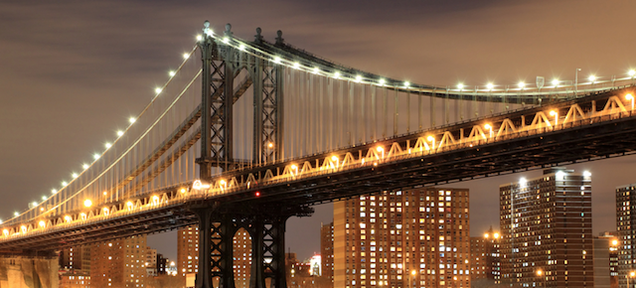![Is the Internet Making Us More Unequal? A Q&A With Astra Taylor]()
Astra Taylor began her career making documentaries about thinkers (Zizek! and Examined Life). Now she's doing the thinking herself. In her new book, The People's Platform: Taking Back Power and Culture in the Digital Age, Taylor argues the Internet isn't as liberating a force as its initial boosters promised. She's joining us at 2 p.m. ET here in Kinja to take questions and talk about her book.
Or, put differently: It is not like the Chocolate Room in the Willy Wonka Chocolate Factory. You can't just walk in and start plucking freedom from liberation trees to snack on.
Taylor is not the first to point out the problems of digital utopianism, but she's not quite in line with the shallow-internet/You Are Not A Gadget crowd either. She's skeptical that the advent of "free culture" has actually made it easier for musicians to make art. She's not sure that the internet has done much more than consolidate the power (and profits) of corporations. But she makes the case, over 230 dense pages, that things could be different, if we wanted them to be. Her preferred solutions involve public institutions.
Oh, and she has this to say about Gawker:
New media gossip juggernaut Gawker also pays tribute to churnalism's animating spirits: shortness, sensationalism, superficiality, and speed. Though writers sometimes buck the trend to post sharp and sardonic opinion pieces and the occasional stand-alone reported essay, the overwhelming majority of what goes up on the site is composed under the glow of a large, prominently placed screen that keeps real-time tabs on the number of views, comments, and "uniques" (new visitors, who are even more valuable to than page views to advertisers), metrics that determine staff bonuses and advancement.
Taylor was kind enough to answer a few questions by phone about her ideas and her book. She's also going to join us in the comments this afternoon if you have questions for her directly.
Can you boil down for me the main reason you think the internet isn't the "democratizing" force we were promised?
Because of money. It makes no sense to talk about the internet as separate from the economy. In the mainstream pundit world, there are two camps. One would say the internet is ruining everything, or distracting, or addictive. The other camp would say the internet's amazing, we're all connected, and it's going to bring about a new age of democratization of culture, and creativity.
It's not [that I have] some revolutionary theory. But there was a disconnect between this chatter from a fundamental characteristic of our world, just sitting there, and I just felt like somebody had to address it. No one was talking about the role of finance and the way business imperatives shape the development of tech.
The web is not an even playing field. There are economic hierarchies, and there's this rich-get-richer phenomenon. And it's emergent of these massive digital corporations, you know, Google and Apple. They're not the upstarts they position themselves as.
Right, and then you argue that they have reorganized the culture to their benefit.
There was this fantasy that the internet would get rid of the old, meddling record labels and middlemen, and finally we would have some sort of fair system. And obviously that's not the case. What we see is already shaped by all sorts of actors, like algorithms that are not transparent that are deciding what content to serve to you. They are engineered to serve the interests of advertisers who are paying for those services.
The first [step] is to just acknowledge we're not in some neutral territory. If we were it would sound crazy to inject some other kinds of values into the system. If you start talking about other arrangements, whether that's developing systems that might support content from a more diverse group of creators, like women, or you know people of color, etc., people worry about paternalism. "Don't turn the internet into the nanny state."
The point is that the services we use are already warped. They're already being used in service of an agenda. And that agenda is advertising-driven. There's already a thing giving form to these spaces online.
Why is that the default? Why is that natural, and to meddle with that is a radical concept?
You talk about Gawker a bit in the book.
I bring it up in the chapter on "churnalism," which is the intense pressure to produce and post and to be up-to-the-minute and how that ultimately becomes essential to financial survival for new media outlets. I think there are individual posts and writers for Gawker whose work I certainly enjoy, and there's a kind of critical take on these issues that Gawker is down for that I really appreciate, actually? Some of the politics and critique are ones I'm sympathetic to, and entertained by. There's the work that people do that kind of transcends the overall [spirit]. And I give credit to the individuals who do that. But I give the writer credit, and not necessarily the company.
But it's one example of a trend, and a sort of trap that people haven't been able to find a way out of. Of course, the shortness, the superficial: these aren't traits that are inherent to the internet. They aren't traits that online news organizations invented. It's not like newspapers were always serious and longform. The traits carried over and intensified on the internet because posts stand alone. You no longer hand a person a a bundle of paper and imagine that they liked [the articles] equally.
People can operate in these conditions and be critical of them at the same time.
Would you say that your book is a Marxist analysis of the internet, on some level?
I guess so, but I tried not to call it that, and I tried not to throw around terms like "neo-liberalism" unnecessarily. I love my Marx, but I just feel like sometimes you can throw around phrases or references that are a signal to other people who agree with you. It's a flash-your-Karl-Marx cred. And that says to your friends, people like mine, okay, I have these references, I'm a radical like you are. And I really wanted to actually show how common-sensical that analysis is, you know?
Why do you think that certain pundits keep insisting that the internet is such a liberating force, full-stop? I have a hard time believing that most people think of it that way.
There's still some inchoate sense that there's this potential there. For example, a radio host said something [to me] like, "Why are you so grumpy? We have so much more power now. If you don't like something that a company's doing, you can tweet at them." You know, so you can tweet your complaint at Frito-Lay or something like that. There's still this confusion about how much power this new ability to participate actually gives us.
The public discourse has really shifted, I think, in the wake of the NSA scandals. Polls show a majority of Americans are spooked by tech companies and think they are overreaching. There's more and more awareness about inequality in the Bay Area. There's discussion about exploitation of the labor force of Amazon and conditions in the warehouse and factories. We've taken a turn away from the utopian, and in a way the [people] I'm arguing with in the book are kind of scrambling to catch up. Because to deny all of these events would just make them sound of touch.
But the boosters and a lot of the dominant critics of tech also come from a business background, so there's not even a real community of traditionally left-wing critics. I mean, Nick Carr and Andrew Keen and Jaron Lanier, they all have experience in the corporate sector. And they're all older white men, and so that colors their [views]. They probably feel nostalgia. I think as a woman writer it's really hard to be nostalgic, because it's not like you want to go back to 1965 or something, right? You want some progress. But you're also positioned to recognize the complexities and the structure of things a little more.
As a woman it's maybe harder to be a techno-utopian, or the opposite.
I think there are a lot of brilliant women writing about tech issues, and I could rattle off quite a few names. There's Rebecca McKinnon and there's Susan Crawford and there's Gabriella Coleman, and Kate Losse, and all sorts of other women. And what's interesting is that they don't fit into that simple binary that I see analysts using. But that also means that they get less attention. Because there is something about the mechanics of the "argumercial," you know, the pro and con, that makes it more difficult for the nuanced view to get traction in the attention economy.
One of your chapters addresses this quite specifically, the issue of how women and people of color haven't found the internet a totally hospitable forum for debate. (It was substantially excerpted here.) Do you have any insight on how to get more kinds of people (women, but also people of color, etc) into the public conversation online?
It's such a tricky issue. You have to keep two perspectives. One is the structural view, which takes into account these low statistics of women or people of color participating, and an understanding of the barriers that certain populations face. As I say in that chapter, it can come down to just the distribution of labor in the home. There are real material conditions that kind of trickle up, and keep people out of the public sphere.
And then as an individual, you kind of have to put your blinders on and figure out how to forge ahead and write no matter what, or create no matter what, and forge ahead and do what it is you want to do? That might make me sound oblivious...
But somehow we have to take those on at a social, collective level. You can't just be one woman with her blinders on trying to fight these structures so much bigger than her. That's why I keep coming back to this idea of building institutions.
I mean, I'm sure that my second film, one reason I was able to make that is that the National Film Board of Canada had a mandate that helped different types of people make movies. That diversifying mandate is why I got to do that project. Those structures are really essential.
Can you briefly explain the concept of "sustainable culture" you advocate for in the book?
"Sustainable culture" is an attempt to outline a vision of another type of economy. There's the issue of actually paying for things. After writing this book I'm more conscientious about paying money for the kinds of things I want to see in the world. Even if it's a subscription to the Los Angeles Review of Books or The New Inquiry. It doesn't take much, it's a gesture of support.
I also try to look at some potential, political, collective solutions. One would be to have a discussion about public media in the digital age. Why is that conversation off the table? I'd like to at least see a conversation about what socially-provided media might be and other modes of financing culture. Advertising is basically a private tax. Advertising is something we pay for because it's basically baked into the price of goods that we buy. It's not "free." It's very inefficient, it's totally opaque, and totally unaccountable. A public tax might be superior in some ways to this private tax that we're all subjected to.
This interview has been condensed and edited.
[Photo by Deborah DeGraffenreid.]




























